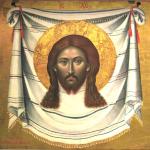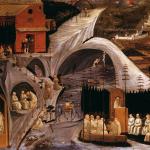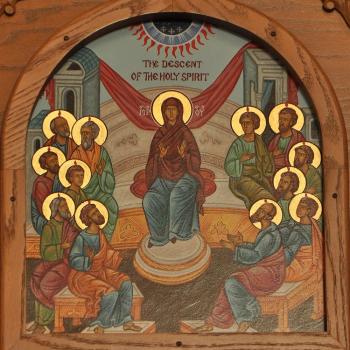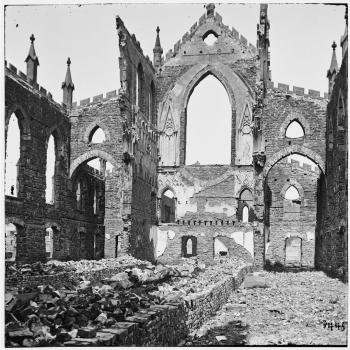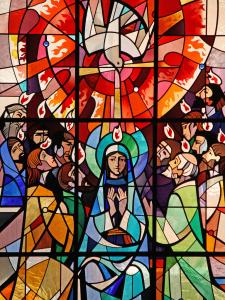
After their encounter with the risen Christ, and their experience of his glorification in his ascension, early Christians were able to come together as one, allowing the grace they received counteract anything which would otherwise divide them and have them contend against each other. In this fashion, they were able to present, even if for a limited time, the eschatological church, the body of Christ, in an empirical form. That is, they were able to show the ideal which Christians were meant to achieve, the ideal which they will have in the eschaton but yet an ideal which sadly they rarely were able to establish in their temporal experience. While it is possible, indeed probable, that the seeds for all kinds of petty feuds and conflicts between Christians remained, they were held in check. For a limited time, they were able to keep their focus on Christ and not themselves. They were living in the world with a new kind of enthusiasm as their understanding of their place in the world, indeed, of the world itself changed as a result of the resurrection. Everything they said and did was still under its influence. Whatever would normally cause them to fight against each other was ignored. They were all looking forward to what was coming next, as they knew something was about to happen, something which would change them even more. And so, as they overcame themselves, they reached out towards each other in the love which Christ told them they should have, the love which allowed them to truly become one and through that oneness, experience the descent of the Holy Spirit upon themselves. For the Holy Spirit is the Spirit of Christ, and as it descended upon Christ, now it is upon them, through their unity with Christ. As Christ is the immanent eschaton, they were able to join themselves in his eschatological glory and on Pentecost experience it at least in part. Through the Spirit coming upon them, they were able to show to the world the glory of the kingdom of God. All that would normally divide people from each other, be it their language, their culture, their gender, their status in the world, was shown to be irrelevant, and as a proof of this, the Holy Spirit made sure that they could and would communicate not only with each other, but with anyone, so that everyone could and would properly understand each other.
Pentecost is often called the birthday of the church because it is when the faithful came together as one and for the first time fully lived out what it meant to be one in the body of Christ. The faithful were able to manifest in time the eschatological unity which humanity will have when it is brought to the eschaton beyond time itself. The body of Christ, the church, is that eschatological unity, and whenever it is manifested and subsists in time and space, we truly have the church. There is but one church even though it can be and is experienced in multiple locations and in a variety of ways similar to the way there is but one eucharist, and what it is, is the same, wherever it is partaken, no matter the physical form in which it is found (be it leavened or unleavened bread, with or without the species of wine, et. al.).
Pentecost was a special event of the church, a special manifestation of the glory which is to come. Temporally, the faithful continued to live in the world. They found themselves changing over time. The purity of the experience of Pentecost did not last. All the seeds of sin, concupiscence and bad habits, and with them, the strife and suffering sin can and does cause, were able to grow and cause havoc in the faith community, causing division and dissension in the empirical, institutional church. Thus, though the institutional church is not other than the eschatological church, because the eschatological church subsists in it, nonetheless the institutional church is found in time and is influenced by and hurt by its temporal existence. The already-and-not-yet pattern of the eschaton is perfectly manifested by this, proving that it is not just some pie in the sky hope for the future, but something which can be and should be experienced in time, even if, until the end of time, we experience is for brief short moments before the ravages of time strike at us and return us to the present moment. Despite whatever pain and sorrow sin causes to those within and without the institutional church by those within the institution, the graces brought to the church thanks to the descent of the Spirit upon it remains, which is why the institutional church, despite all the evil which can be done in and by it, still is capable of also providing grace, helping many people attain salvation.
Thus, Scripture presents to us what was, what is, and what shall be in the way the early Christian community came together as one:
When the day of Pentecost had come, they were all together in one place. And suddenly a sound came from heaven like the rush of a mighty wind, and it filled all the house where they were sitting. And there appeared to them tongues as of fire, distributed and resting on each one of them. And they were all filled with the Holy Spirit and began to speak in other tongues, as the Spirit gave them utterance (Acts 2:1-4 RSV).
The church is one, as it is one in its eschatological glory, and yet, due to its temporal manifestation, the way it subsists in the world, Christians often find themselves divided against each other, not living out their calling to be a sign of unity in the world. Christian sin fights against and undermines that unity, and yet, because of the eschatological nature of the church, sin, and the temporal divisions it establishes, does not have the final say. In the end, Christ will make sure everything and everyone becomes united as one so that God can be all in all (cf. 1 Cor. 15:28). Thus, though there will be all kinds of sin found coming from the institutional church, that sin, which is indeed something which must be fought against and rejected, does not have the power to overcome Christ and his victory over sin. Whatever evil, whatever abuses, comes from the Christian community will require penance, and with it, purification. This is possible because Christ’s grace continues to be shared to the faithful so that their sins do not have the power to truly annihilate and destroy what God wants to establish and preserve. Christ’s grace is not dependent upon the goodness of the faithful or the institutional church, but rather is dependent upon the loving graciousness of God who freely offers and continues to give it so to heal all from the ravages of sin.
Because of the evil which is found coming in and from the institutional church, especially through many of its most vocal members (be they clergy or laity), many, through no fault of their own, will find themselves having to create a space between themselves and the institution. They still have faith, they still have grace, and so they still have a connection to the eschatological church and as such, they can and will find salvation, and it will be in and through the church, in whatever way(s) God creates for them to have a connection with it. Nonetheless others will find themselves called to being within the institution, hoping to work within it to bring about its needed reform. They will understand that grace remains shared in and through the institution, despite the view of the Donatists, though they will understand that the sign of that grace is lacking and so they will work to help reestablish it so others will be able to see the good which can and should be done through the institution.
Both kinds of faithful, those who feel they cannot engage the institutional church for the suffering and abuse they have experienced, as well as those who remain within the institutional church seeking its reform, can be seen to be working together, each representing a sign of the church and the eschatological graces given to it. Though the eschatological church is not some sort of invisible church, because it subsists in time and is found within an institutional church, it is not to be seen merely as the institution. The institution is meant to let itself reflect the full eschatological church, and the more it does, the more it will look and appear otherworldly, as it did at Pentecost. For the more it finds temporal conflicts, all the pursuits many have for power through institutional office, and all the corruption which brings discord to the institution and causes all kinds of pain and sorrow to those who want to be faithful members of the church, vanish, the more the institution will be as it was meant to be and was at Pentecost. Then those who feel abandoned or hurt by the institution will be able to see themselves being loved and affirmed by it, allowing them to feel as if they can once again join themselves to the institution once again (so long as that Pentecostal spirit remains). Then the sign of Christian unity can once again be shown on earth as it will be in heaven.
Ever since Pentecost, the Holy Spirit remains active in and through the institutional church, even as the Spirit blows where she wills, and so is not found to be bound by the institution and its normative ways of providing grace. That is, the Holy Spirit is not confined to the institution, but rather she works in and with the institution, using it as the focal point of her work. The Spirit works to unite humanity together as one. She finds ways to bring about the eschatological unity, both within the institution and the graces it has and shares with the world, and outside of it, as she helps those who are open to it but find themselves struggling for whatever reason to participate with the institution. This is as it should be for, as we see on Pentecost, those who were not Christians found the Spirit working in and with them, helping them understand what the Christians were saying in their own tongues, using the sign of unity, established in and through love, to draw them in to the eschatological glory for themselves.
Stay in touch! Like A Little Bit of Nothing on Facebook.
If you liked what you read, please consider sharing it with your friends and family!


